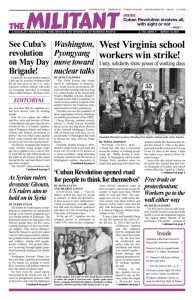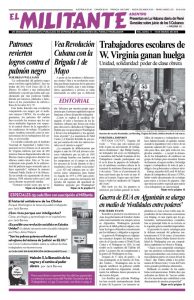Russian President Vladimir Putin seeks to sustain the gains the country’s capitalist rulers have made in extending their influence through Moscow’s military intervention in the Mideast and Ukraine without provoking unrest at home. The U.S. rulers want to push back Moscow’s growing clout in parts of the world where Washington has held sway for decades.
When alleged Russian mercenaries returned in body bags from a firefight with U.S.-led forces in Syria last month, the government at first refused to admit there had been any deaths, then acknowledged some Russians had been killed, but insisted they had no connection to Moscow’s military. In order to hide the extent of its military operations in Syria, the Russian government keeps its spending on wars abroad top secret.
They’ve refused to respond to continuing indications that significantly more Russian fighters were killed in Syria, or that they had been trained at Moscow’s bases there and treated in Russian military hospitals.
Putin has insisted the Syria and Ukraine wars are popular in Russia. But a September opinion poll shows nearly half of those asked thought Moscow should end its military campaign in Syria.
While Putin says he is winding down military involvement there, fighting continues and he has no intention of relinquishing the expanding influence Moscow has won through its brutal air war on behalf of the Bashar al-Assad regime in Syria. It has given Russia’s capitalist rulers a stronger political hand against the U.S. and other rivals in the Mideast. They have drawn the rulers in Turkey, who had sought the overthrow of the Assad regime, closer to their orbit.
Last year Putin secured Assad’s agreement to expand the Russian naval base at Tartus on Syria’s Mediterranean coast. Syrian government official Tareq al-Jawebra told the Financial Times March 2 that Russian companies get a cut from revenue generated by Syrian oil fields captured from Islamic State by Russian private military contractors.
Moscow is preparing a deal with the rulers in Egypt to deploy its warplanes there.
Russia’s capitalist class emerged and developed as the U.S. rulers — acting on the illusion they had won the Cold War — moved to extend the reach of U.S. imperialism’s armed might closer to the borders of Russia. Washington took eastern European countries into membership in its NATO military alliance and deployed anti-ballistic missile systems in Romania and Poland.
Putin has developed allies in Europe from both left parties and anti-EU groups.
Moscow sought to defend Russian capitalist interests by creating a buffer zone in territories near the Russian border, organizing military intervention in Georgia and Ukraine, including the annexation of Crimea, dealing blows to the sovereignty of both countries.
In his annual State of the Nation address March 1, Putin announced the development of new low-flying cruise missiles with nuclear warheads that can avoid detection by U.S. missile defense systems. None of Washington’s anti-ballistic missile defense systems give it the capacity to cripple intensive long-range missile strikes targeting U.S. territories.
Between them Washington and Moscow have the overwhelming majority of the world’s nuclear warheads, with the capacity to destroy human life on earth many times over.
“No one has managed to restrain Russia,” Putin boasted in his address.
US Defense Strategy targets Moscow
Washington remains the most powerful military power worldwide, but it faces new challenges from both Moscow and Beijing.
“Russia seeks veto authority over nations on its periphery in terms of their governmental, economic, and diplomatic decisions, to shatter the North Atlantic Treaty Organization and change European and Middle East security and economic structures to its favor,” Secretary of Defense James Mattis wrote in the U.S. rulers’ new National Defense Strategy, released Jan. 19.
The U.S. capitalist rulers’ dominant place in the world depends on finding ways to win out in the sharpening “great power competition” with Moscow, as well as Beijing, he said. The document proceeds to outline steps to make Washington’s military machine a “more lethal, resilient and rapidly innovating Joint Force.”
Moscow’s military intervention in Syria, following its assaults on national sovereignty in Georgia and Ukraine, is an extension of the Russian rulers’ efforts to increase the exploitation of working people at home. In their drive for profits and competitive position they press against workers’ wages and conditions, and at the same time are driven to confront rival capitalists for markets abroad. U.S. sanctions and the cost of Moscow’s wars has led the government to belt-tightening measures at home. Actions like last year’s truck drivers strikes — which won broad working-class support — are one result.
Despite efforts to detain or silence their political opponents, the Russian rulers have been unable to quash those finding ways to speak out against their war moves. Three members of Russian political punk rock group Pussy Riot were briefly detained Feb. 27 in Crimea where they went to protest against the imprisonment of Ukrainian filmmaker Oleg Sentsov. Framed up on conspiracy charges, Sentsov is an outspoken opponent of Moscow’s annexation of Crimea.
The radio station Echo of Moscow reports there were rotating one-person pickets — the only kind deemed legal without a hard-to-get permit — outside the Russian Ministry of Defense opposing Moscow’s Syria intervention Feb. 11.

